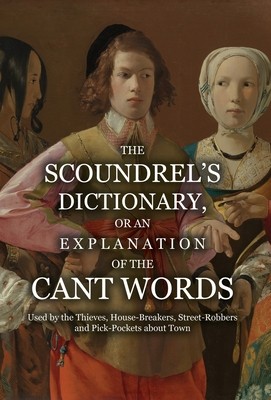
- We will send in 10–14 business days.
- Author: Anonymous
- Publisher: Spradabach Publishing
- ISBN-10: 1909606413
- ISBN-13: 9781909606418
- Format: 14 x 21.6 x 0.8 cm, kieti viršeliai
- Language: English
- SAVE -10% with code: EXTRA
The Scoundrel's Dictionary, or an Explanation of the Cant Words Used by the Thieves, House-Breakers, Street-Robbers and Pick-Pockets about Town (e-book) (used book) | bookbook.eu
Reviews
Description
The Scoundrel's Dictionary was first published in 1754, in a rough-and-ready pocket edition designed for practical use, the product of a time of rising crime, when criminals were viewed as folk heroes. Despite the romantic framing story provided on the title page, however, the text is largely derived from Shirley's The Triumph of Wit (1688), and the cant entries in B. E.'s A New Dictionary of the Terms Ancient and Modern of the Canting Crew (1699). All the same, The Scoundrel's Dictionary has its own charms, having had presumed contact with the beggars; its studious predecessors were, by contrast, intended for the diversion of the middle class, and were designed for consultation, or found only, in libraries. The volume is also more than simply a dictionary, since it contains a number of expository essays on the types of person who used the cant lexicon, when and for what purposes it was used, how its users were inducted into gangs, their methods of operation, and so on, plus a collection of songs, both in cant and in plain English translation. Since so many copies are thought to have been destroyed in a great fire, the original 18th-century edition is extremely rare, with only one having ever appeared at auction since 1976.
EXTRA 10 % discount with code: EXTRA
The promotion ends in 23d.05:52:34
The discount code is valid when purchasing from 10 €. Discounts do not stack.
- Author: Anonymous
- Publisher: Spradabach Publishing
- ISBN-10: 1909606413
- ISBN-13: 9781909606418
- Format: 14 x 21.6 x 0.8 cm, kieti viršeliai
- Language: English English
The Scoundrel's Dictionary was first published in 1754, in a rough-and-ready pocket edition designed for practical use, the product of a time of rising crime, when criminals were viewed as folk heroes. Despite the romantic framing story provided on the title page, however, the text is largely derived from Shirley's The Triumph of Wit (1688), and the cant entries in B. E.'s A New Dictionary of the Terms Ancient and Modern of the Canting Crew (1699). All the same, The Scoundrel's Dictionary has its own charms, having had presumed contact with the beggars; its studious predecessors were, by contrast, intended for the diversion of the middle class, and were designed for consultation, or found only, in libraries. The volume is also more than simply a dictionary, since it contains a number of expository essays on the types of person who used the cant lexicon, when and for what purposes it was used, how its users were inducted into gangs, their methods of operation, and so on, plus a collection of songs, both in cant and in plain English translation. Since so many copies are thought to have been destroyed in a great fire, the original 18th-century edition is extremely rare, with only one having ever appeared at auction since 1976.


Reviews